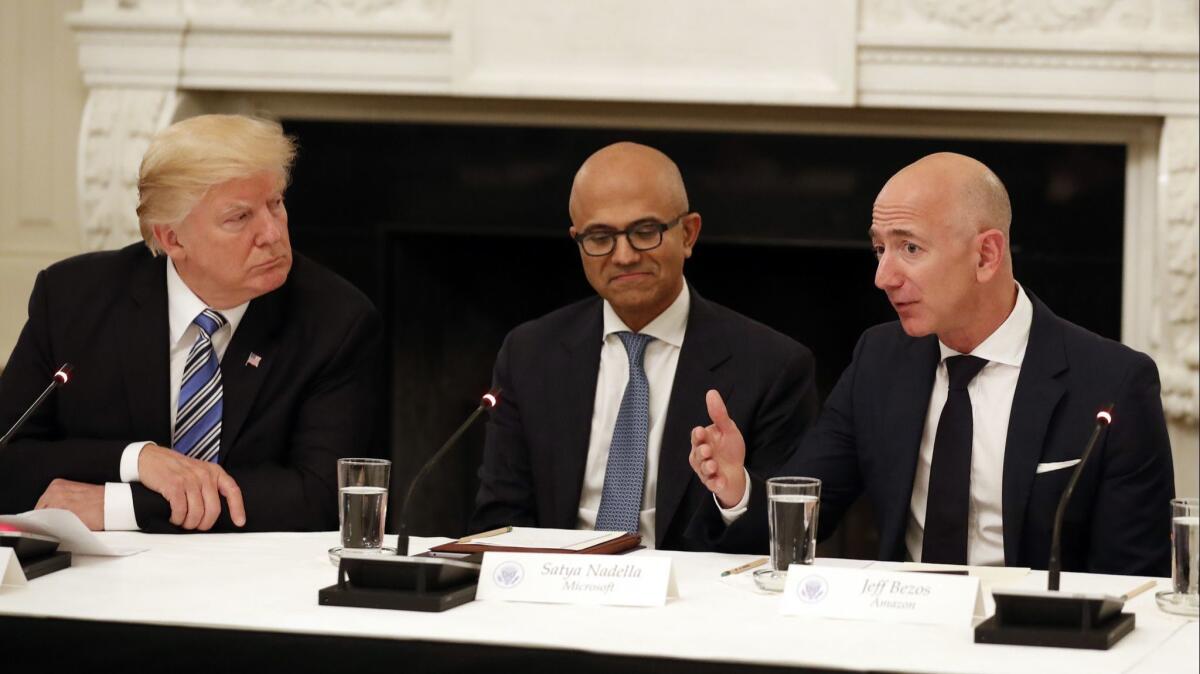Opinion: Trump to Amazon: Drop dead

- Share via
It’s been a steep learning curve for President Trump, and he still doesn’t seem to have a grasp on the difference between the American presidency and, say, a tinpot dictatorship.
Axios’ Jonathan Swan reported Wednesday morning that Trump is “obsessed” with Amazon. The online retailing giant’s owner, Jeff Bezos, also owns the Washington Post, which treats Trump like a piñata that just (whap!) won’t (whap!) release (whap!) its (whap!) candy (whap-whap-whap!). What a coincidence.
One unnamed source told Swan that Trump has “wondered aloud if there may be any way to go after Amazon with antitrust or competition law.” He also suggested changing how Amazon is treated by tax law and complained about the amount Amazon pays the U.S. Postal Service for Sunday delivery.
We’ve already seen how Trump’s public comments move the stock market, for better or worse. The Axios story showed how reporting on his private comments can have a similar effect. As of this writing, Amazon’s stock was down 5%, a loss of roughly $35 billion in value. (That’s something of a rebound; the stock’s initial drop temporarily vaporized more than $50 billion in value.)
Granted, Amazon’s disruptive power in a growing number of markets is a matter of legitimate concern for policymakers and regulators. So is the way Amazon and other online retailers have avoided collecting sales taxes from shoppers, giving them an unfair advantage over local merchants (a problem The Times editorial board has called on Congress to fix).
What’s unseemly here is the degree to which the president seems to be targeting a company — or, rather, a businessman — with whom he has a personal beef. It’s also unnerving to see a president ticking through the ways federal departments and independent agencies might be deployed to further that end.
Antitrust and competition policy are the domain of the Federal Trade Commission (an independent agency) and the Justice Department. Trump’s tweets over the last 14 months have betrayed a Nixonian desire to bend the Justice Department to his will, whether it be telling the department whom to investigate and prosecute, how to defend the administration in court, or how to handle the probe into Russian meddling, to cite just a few examples. When he does so, however, he undermines the department’s legitimacy.
There may be no better illustration of that problem than the Justice Department’s effort to block AT&T’s purchase of Time Warner on antitrust grounds. Although the department has rarely challenged that kind of “vertical integration” in recent years, the merger would give the companies more power to harm competing video services and their customers. Thanks to Trump’s comments about Time Warner’s CNN, however, the lawsuit seems more like presidentially directed payback than an honest attempt to protect competition in video services. The case is now being tried in federal court in Washington.
Trump doesn’t have a specific plan for Amazon, Swan wrote, and if so, that’s a good thing. If the president wants to lay out his administration’s approach to competition policy, great. But he should leave the questions of whether Amazon complies with the law and competes fairly to the FTC, the Justice Department and Congress.
Twitter: @jcahealey
More to Read
A cure for the common opinion
Get thought-provoking perspectives with our weekly newsletter.
You may occasionally receive promotional content from the Los Angeles Times.







